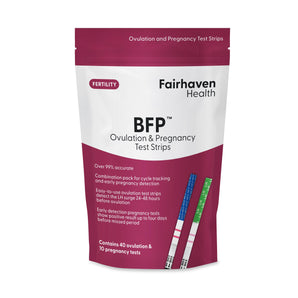By Avni Dalal, ND
Polycystic ovarian syndrome (PCOS) is a common condition that affects millions of women globally—characterized by hormone imbalances like high amounts of androgens, irregular periods, and often metabolic challenges like insulin resistance. While the exact causes of PCOS are not fully understood and still being studied, a growing body of research suggests that targeted nutritional and lifestyle interventions can support hormone regulation, egg quality, and metabolic health for those with PCOS.*
In this blog, we’ll delve into key nutrients that have been shown to benefit women with PCOS to better support hormone balance, cycle regularity and ovarian health, and mitochondrial function and cellular energy production.*
40:1 Blend of Myo-Inositol and D-Chiro Inositol
One of the most popular and widely studied combinations for PCOS care is a 40:1 blend of myo-inositol and D-chiro inositol, which mimics the naturally occurring ratio of these two molecules in the body. Myo- and D-chiro inositol work together to support hormone balance and promote ovulation, making them especially useful for improving cycle regularity in women with PCOS.1* They also are involved in insulin signaling pathways for better insulin regulation—an important factor for many women with PCOS.*
Additionally, this blend supports egg quality by enhancing ovarian function.* By optimizing how cells respond to insulin and ensuring the ovaries have what they need to produce healthy eggs, the 40:1 combination can improve reproductive outcomes for individuals trying to conceive.3*
Powerful Antioxidants for Reproductive Health
Oxidative stress can significantly impact reproductive health, affecting both egg and sperm quality, mitochondrial function, and hormone production and balance.* A combination of antioxidants–alpha-lipoic acid (ALA), pyrroloquinoline quinone (PQQ), coenzyme Q10 (CoQ10), and astaxanthin—offers potent protection against oxidative stress to support mitochondrial health, which is crucial for the cells that produce hormones and for overall reproductive function.*
Alpha-Lipoic Acid (ALA)
ALA is a powerful antioxidant that works directly to neutralize free radicals, mitigating oxidative stress that can harm reproductive cells.* ALA also helps regenerate other antioxidants in the body, such as glutathione and CoQ10, enhancing the body’s overall antioxidant capacity.* It plays a critical role in glucose metabolism by supporting the signaling of glucose transporters and also improving liver function.4* Furthermore, it acts as a coenzyme for mitochondrial energy production, which is essential for highly reproducing cells such as hormone-secreting cells and for sperm production.*
Pyrroloquinoline Quinone (PQQ)
PQQ is a potent antioxidant and cellular signaling molecule that plays a significant role in mitochondrial function and cellular energy production.* While direct research on PQQ and PCOS is limited, the underlying mechanisms by which PQQ can support PCOS care are tied to its effects on oxidative stress, mitochondrial health, and metabolic regulation—all key factors in managing PCOS symptoms.*
Due to the powerful antioxidant effect PQQ plays in the mitochondria, balanced control of energetics can be achieved, which supports the hormone—metabolic balance is required to reduce insulin resistance. As a result, cycle regularity can more effectively be achieved.
Coenzyme Q10 (CoQ10)
CoQ10 is a highly important component of cellular energy production, particularly in the mitochondria. CoQ10 supports the energy demands of cells all over the body, including reproductive cells that aid in sperm production and egg quality preservation.* As women age or experience hormone issues like those seen in PCOS, CoQ10 levels may decline, making supplementation a useful tool for maintaining reproductive health and providing stronger support needed to improve fertility and pregnancy rates.*
Astaxanthin
Astaxanthin, a fat-soluble pigment belonging in the carotenoid family, is known for its exceptional antioxidant properties and ability to influence cellular signaling.* It protects the mitochondria and cells from oxidative damage to support cellular energy production and ovarian health.* Astaxanthin’s therapeutic benefits are more effective when combined with PQQ and CoQ10, making it a valuable nutrient for PCOS care.*
Together, these antioxidants create a synergistic effect, enhancing the body’s ability to neutralize free radicals and improve cellular energy production.
B Vitamins for Hormonal and Reproductive Health
B vitamins, including vitamins B6, B9 (folate, 5-MTHF), and B12, are crucial for supporting reproductive health and overall hormone balance in women with PCOS. These vitamins are key players in the methylation cycle, which is essential for DNA synthesis and repair—processes that are critical for egg and sperm health.
- Vitamin B6 (pyridoxine): Vitamin B6 is involved in the regulation of homocysteine levels, which is important, as elevated homocysteine is associated with increased cardiovascular risk and insulin resistance in PCOS.5* It is also involved in neurotransmitter “brain chemical” synthesis to help regulate mood for those who may experience mood swings with other premenstrual symptoms.5*
- Vitamin B9 (folate, 5-MTHF): Folate is essential for the development of healthy eggs and is involved in DNA synthesis, repair, and methylation, all of which contribute to healthy reproductive outcomes.* Supplementation of folate has been shown to normalize homocysteine levels, which may positively affect fertility, insulin regulation, and androgen levels.5,6*
- Vitamin B12: Along with folate, vitamin B12 supports DNA production and is essential for healthy egg and sperm development.* B12 is also involved in energy production and helps maintain proper nervous system function.* Supplementation with B12 has been shown to improve insulin markers and homocysteine levels in the blood, thereby potentially improving reproductive outcomes in PCOS patients.5,7,8*
Summary
Managing PCOS symptoms involves a multifaceted approach, and nutrition plays a crucial role in supporting hormone production, reproductive health, metabolic control, and mitochondrial energy production. Myo-inositol and D-chiro inositol provide well-rounded benefits, while antioxidants like ALA, PQQ, CoQ10, and astaxanthin protect our cells from oxidative damage.* Lastly, vitamins B6, B9, and B12 are essential for methylation, DNA genetic expression, cycle regularity, and mood support.*
By incorporating these nutrients into a daily regimen, women with PCOS can address some of the underlying issues that may be contributing to their symptoms and improve their overall health.* As a reminder, always consult with a healthcare provider before beginning any new supplement regimen.
References:
1. Nordio M et al. Eur Rev Med Pharmacol Sci. 2019;23(12):5512-5521.
2. Kamenov Z et al. Molecules. 2020;25(23):5566.
3. Kachhawa G et al. Int J Gynaecol Obstet. 2022;158(2):278-284.
4. Genazzani AD et al. Gynecol Endocrinol. 2024;40(1):2341701.
5. Thornburgh S et al. Curr Opin Endocrinol Diabetes Obes. 2022;29(6):554-559.
6. Bahmani F et al. Clin Endocrinol (Oxf). 2014;81(4):582-587.
7. Kaya C et al. Reprod Biomed Online. 2009;19(5):721-726.
8. Carrasco-Cabezas M et al. Nutrients. 2024;16(12):1937.










